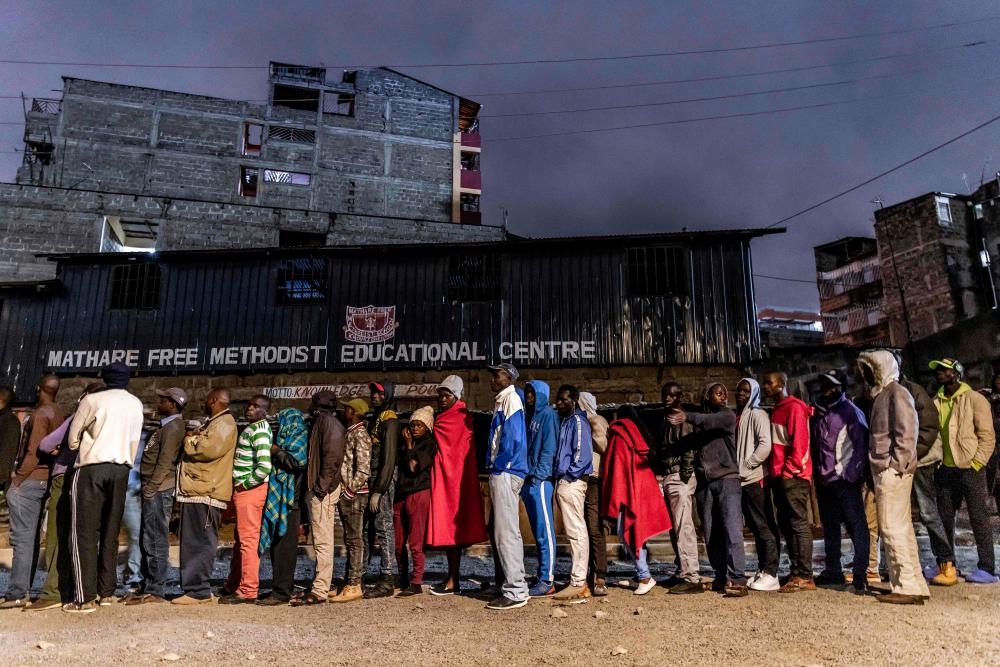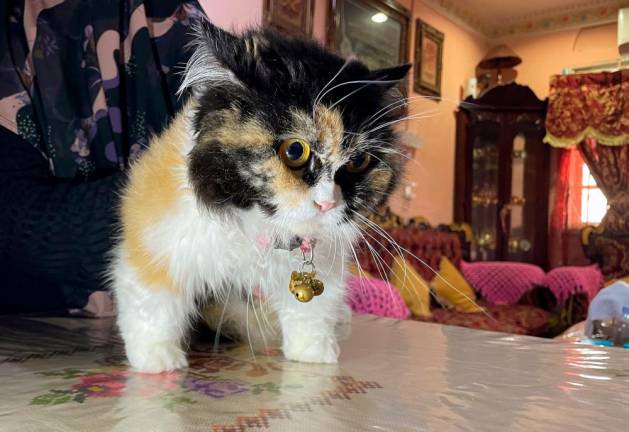NAIROBI: Kenyans lined up to vote in a high-stakes election Tuesday, with the East African powerhouse on edge as two political heavyweights battle it out in a fiercely contested race for the presidency.
Kenyans are praying for a peaceful transition of power after almost a decade under President Uhuru Kenyatta, but concerns about vote-rigging linger in a nation still haunted by previous election disputes that descended into deadly violence.
More than 22 million have registered to vote in an election taking place against a backdrop of soaring prices for food and fuel, a punishing drought that has left millions hungry, and deep disenchantment with the political elite, particularly among the youth.
The deputy president and erstwhile heir apparent William Ruto, 55, is pitted against Raila Odinga, the 77-year-old veteran opposition leader now backed by Kenyatta after a stunning shift in political allegiances.
Before dawn in Odinga’s stronghold in the lakeside city of Kisumu, voters in lines many hundreds of metres long queued in the dark outside polling stations as motorcyclists passed by honking and blowing whistles.
Moses Otieno Onam, 29, said woke up at 3:00 am to be near the front of the queue in Obunga, an informal settlement in the city centre.
“I woke up early so that I go and choose my leader who might bring change. I have hope in that,“ he told AFP.
Polling stations opened from 6:00 am (0300 GMT) and are due to close at 5:00 pm (1400 GMT).
Analysts have in recent days suggested that Odinga, a onetime political prisoner and former prime minister who is making his fifth bid for the job, could narrowly edge past his younger rival.
But if neither wins more than 50 percent, Kenya would be forced to hold a run-off for the first time in its history.
Despite mudslinging on the hustings and widespread disinformation, campaigning passed off largely peacefully in contrast to previous polls.
Pressure is on the Independent Electoral and Boundaries Commission to ensure a free and fair vote in all six polls -- for the presidency as well as for senators, governors, lawmakers, woman representatives and some 1,500 county officials.
But already, the election has run into some hitches, with six IEBC officials arrested Monday and the commission suspending constituency or gubernatorial polls in several counties because of erroneous ballot papers.
IEBC head Wafula Chebukati vowed that the body would not hesitate to take “stern action” against any official flouting election laws.
- Beacon of stability -
Kenya’s international partners are keenly watching the vote in a country considered a beacon of stability and democracy in a troubled region, with diplomats voicing cautious optimism it will pass off largely violence-free.
Both Odinga and Ruto have called for a peaceful vote, but fears remain that if the losing candidate challenges the outcome -- as widely expected -- the discord could erupt into street fighting.
Security is tight, with more than 150,000 officers being deployed.
The trauma of the 2007 election, which was followed by a horrific bout of politically motivated ethnic clashes that killed more than 1,100 people, still looms large.
And Odinga’s challenge to the 2017 election result that saw then foe Kenyatta re-elected was met with a heavy-handed police response which left dozens dead.
The Supreme Court ordered a rerun in 2017, citing widespread irregularities in the counting process and mismanagement by the IEBC.
No presidential election outcome has gone uncontested since 2002, and there will be an anxious wait for this year’s results which are not expected for several days.
“Kenya votes, East Africa holds breath,“ was the headline in The East African regional newspaper.
With neither Ruto nor Odinga belonging to the dominant Kikuyu tribe, which has produced three of the country’s four presidents, the election will open a new chapter in Kenya’s history.
- ‘Jobs, jobs, jobs’ -
Ruto, who said he once sold chickens on the roadside, has painted the election as a battle between ordinary “hustlers” and “dynasties” -- the Kenyatta and Odinga families that have dominated Kenyan politics since independence from Britain in 1963.
Some observers say economic pressures could compete with tribal allegiances as the key factor driving voter behaviour in a country where a third of the population lives in poverty.
“The reshaped electoral chessboard means the outcome will probably come down to the degree to which Odinga and Ruto can muster support outside their respective bases,“ the International Crisis Group’s East and Southern Africa analyst Meron Elias said in a note.
Lawyers David Mwaure and George Wajackoyah -- the latter an eccentric former spy who wants to legalise marijuana -- are also running but are likely to trail far behind the frontrunners.
If Odinga wins, his running mate Martha Karua would become deputy president, the first woman to hold the post.
Both candidates have vowed to get the economy back on its feet, rein in Kenya’s mammoth $70 billion debt mountain and tackle the corruption that infects every level of society.
Already hit hard by the Covid pandemic that threw hundreds of thousands out of work, Kenyans are now battling soaring inflation as the Ukraine war sends prices of basic necessities spiralling. - AFP













